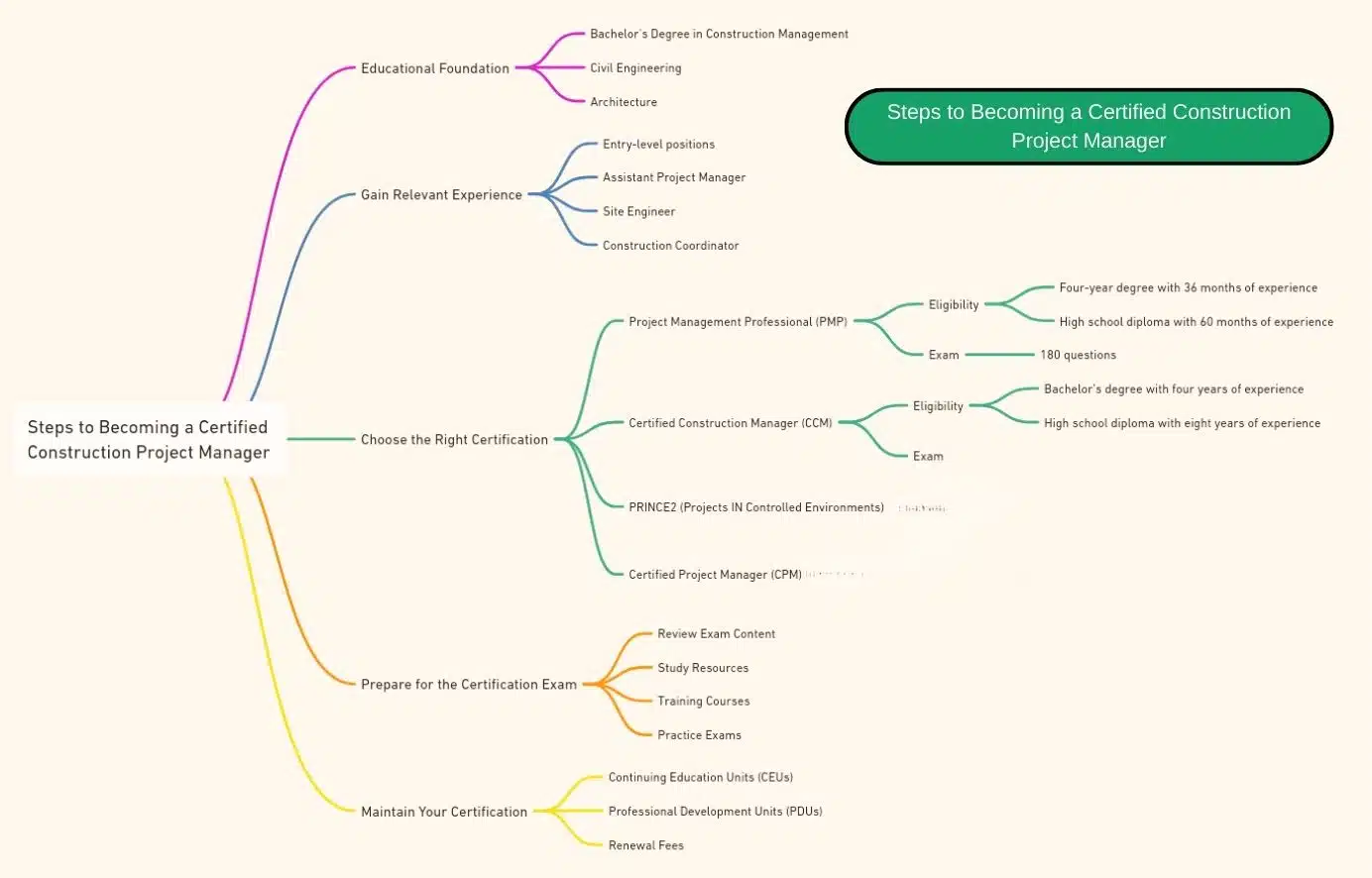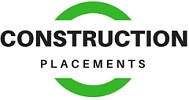Last Updated on June 13, 2024 by Admin
The role of a construction project manager is pivotal in ensuring the successful completion of construction projects. The demand for skilled and certified construction project managers has never increased, with the construction industry evolving rapidly. This guide aims to thoroughly understand how to become a certified construction project manager in 2024, offering valuable insights for a global audience.
The construction industry is a dynamic field characterized by complex projects that require meticulous planning, coordination, and execution. As a construction project manager, you will be at the helm of these projects, ensuring they are completed on time, within budget, and to the desired quality standards. Certification in construction project management validates your skills and enhances your career prospects in this competitive industry.
Why Certification Matters
Certification in construction project management is a testament to your expertise and dedication to the profession. It provides several benefits:
- Credibility and Recognition: Certification marks your professional capability as recognized globally.
- Career Advancement: It opens doors to higher-level positions and increases earning potential.
- Skill Enhancement: Certification programs offer advanced knowledge and best practices in project management.
- Networking Opportunities: Being part of a certified community allows you to connect with other professionals and industry leaders.
Table of Contents
Understanding the Role of a Construction Project Manager
Before diving into the certification process, it’s crucial to understand what a construction project manager does. This role encompasses various responsibilities, including:
- Project Planning: Developing detailed project plans that outline scope, schedule, and budget.
- Resource Management: Allocating resources effectively to ensure project milestones are met.
- Risk Management: Identifying potential risks and implementing mitigation strategies.
- Team Leadership: Leading a team of professionals, including engineers, architects, and contractors.
- Stakeholder Communication: Maintaining clear and consistent communication with stakeholders to ensure project alignment.
- Quality Control: Ensuring the project meets all quality standards and regulatory requirements.
Watch the video below to learn more about the Role of a Construction Project Manager;
Steps to Becoming a Certified Construction Project Manager
1. Educational Foundation
A strong educational background is the first step toward becoming a construction project manager. While there is no single path, certain degrees are highly beneficial:
- Bachelor’s Degree in Construction Management: This degree provides a comprehensive understanding of construction processes, project management principles, and industry-specific knowledge.
- Civil Engineering: A degree in civil engineering offers technical expertise that is invaluable in managing construction projects.
- Architecture: An architectural background helps in understanding design principles and collaborating effectively with design teams.
2. Gain Relevant Experience
Experience in the construction industry is essential. Entry-level positions such as assistant project manager, site engineer, or construction coordinator provide practical knowledge and skills. Aim to accumulate at least 3-5 years of relevant experience before pursuing certification.
3. Choose the Right Certification
Several certifications are available globally, each with its own set of requirements and benefits. Here are some of the most recognized certifications for construction project managers:
Project Management Professional (PMP)
The Project Management Institute (PMI) offers the PMP certification as one of the most prestigious credentials in the field. It covers a broad range of project management principles and practices.
- Eligibility:
- A four-year degree with 36 months of project management experience and 35 hours of project management education/training or a CAPM certification.
- A high school diploma or associate degree with 60 months of project management experience and 35 hours of project management education/training or a CAPM certification.
- Exam: The PMP exam consists of 180 questions covering areas such as initiating, planning, executing, monitoring and controlling, and closing projects.
Certified Construction Manager (CCM)
The CCM certification, offered by the Construction Management Association of America (CMAA), is specifically tailored for construction managers.
- Eligibility:
- A bachelor’s degree in construction management or a related field, plus four years of experience.
- A high school diploma plus eight years of experience in construction management.
- Exam: The CCM exam covers areas like project management, cost management, time management, quality management, contract administration, and safety.
PRINCE2 (Projects IN Controlled Environments)
PRINCE2 is a process-based method for effective project management, widely used in the UK and internationally.
- Eligibility: There are no specific prerequisites for the Foundation level, but passing it is required to proceed to the Practitioner level.
- Exam: The PRINCE2 Foundation exam tests basic knowledge, while the Practitioner exam assesses the ability to apply PRINCE2 principles in real-life scenarios.
Certified Project Manager (CPM)
The CPM certification, offered by the International Association of Project Managers (IAPM), is globally recognized and covers general project management principles.
- Eligibility: There are no strict prerequisites, but project management experience is beneficial.
- Exam: The CPM exam covers project initiation, planning, execution, monitoring, and closing.
4. Prepare for the Certification Exam
Preparation is key to passing certification exams. Here are some steps to help you prepare effectively:
- Review Exam Content: Understand the exam structure and content areas. Certification bodies often provide detailed exam outlines.
- Study Resources: Utilize study guides, textbooks, and online resources. Many certification bodies offer official study materials.
- Training Courses: Enroll in training courses or boot camps. These can be in-person or online and are designed to cover all aspects of the exam.
- Practice Exams: Take practice exams to familiarize yourself with the question format and time constraints. This also helps identify areas where you need further study.
5. Maintain Your Certification
Once certified, it’s essential to maintain your certification through continuing education and professional development. Most certification bodies require periodic renewal, which may involve:
- Continuing Education Units (CEUs): Participate in courses, workshops, or webinars to earn CEUs.
- Professional Development Units (PDUs): Engage in professional development activities, such as attending conferences, writing articles, or mentoring others.
- Renewal Fees: Pay the required renewal fees and submit proof of continuing education.

Global Perspectives on Certification
While the certification process is relatively standardized, it’s important to consider regional variations and preferences in construction project management. Here’s a brief overview of how certification is viewed in different parts of the world:
North America
In North America, certifications like PMP and CCM are highly valued. The construction industry here emphasizes robust project management skills and adherence to strict regulatory standards. Additionally, there is a growing trend towards sustainability and green building practices, making certifications in LEED (Leadership in Energy and Environmental Design) increasingly relevant.
Europe
In Europe, PRINCE2 is widely recognized alongside PMP. The construction industry often aligns with European Union regulations, which emphasize quality and safety standards. Countries like the UK, Germany, and France have robust construction industries that value certification as a mark of professionalism and competence.
Asia-Pacific
The construction boom in Asia-Pacific countries, particularly China, India, and Australia, has increased demand for certified project managers. PMP and PRINCE2 certifications are popular, and there is an increasing focus on certifications related to sustainable construction and smart city projects.
Middle East
With its numerous large-scale construction projects, the Middle East highly values PMP certification. The region’s construction industry is known for its rapid growth and ambitious projects, making project management certification a key asset for professionals looking to advance their careers.
Related Courses:
- Construction Project Management
- Introduction to Supply Chain Finance & Blockchain Technology
- Renewable Energy Technology Fundamentals
- Digital Transformation and Industry 4.0 Masterclass
Advanced Certifications and Specializations

As the construction industry evolves, advanced certifications and specializations are becoming increasingly important. These credentials allow project managers to focus on specific areas of interest and expertise, such as sustainability, risk management, or technology integration.
LEED Accreditation
Leadership in Energy and Environmental Design (LEED) is a recognized green building certification. LEED Accredited Professionals (LEED AP) demonstrate expertise in sustainable building practices and can lead projects to achieve LEED certification.
- Eligibility: No strict prerequisites exist, but experience in green building projects is beneficial.
- Exam: The LEED AP exam covers sustainable sites, water efficiency, energy and atmosphere, materials and resources, and indoor environmental quality.
Agile Certified Practitioner (PMI-ACP)
The Agile Certified Practitioner (PMI-ACP) certification, offered by PMI, is ideal for project managers working in agile environments. It demonstrates knowledge of agile principles and practices, which are increasingly applied in construction projects to enhance flexibility and responsiveness.
- Eligibility:
- Secondary degree with 21 contact hours of training in agile practices and 12 months of general project experience within the last 5 years.
- 8 months of agile project experience within the last 3 years.
- Exam: The PMI-ACP exam covers agile principles, techniques, and practices.
Risk Management Professional (PMI-RMP)
The Risk Management Professional (PMI-RMP) certification, also offered by PMI, focuses on identifying and managing project risks. This certification is particularly useful for construction project managers, given the inherent risks associated with construction projects.
- Eligibility:
- A secondary degree with at least 36 months of project risk management experience within the last 5 years and 40 hours of project risk management education.
- A four-year degree with at least 24 months of project risk management experience within the last 5 years and 30 hours of project risk management education.
- Exam: The PMI-RMP exam covers risk strategy and planning, risk identification, risk analysis, risk response, and risk monitoring and control.
Leveraging Technology in Construction Project Management
In 2024, technology plays a crucial role in construction project management. Understanding and leveraging these technologies can significantly enhance your efficiency and effectiveness as a project manager.
Building Information Modeling (BIM)
Building Information Modeling (BIM) is a digital representation of the physical and functional characteristics of a facility. BIM allows for better collaboration, visualization, and management of construction projects.
- Certification: Several organizations offer BIM certification, including the Autodesk Certified Professional: Revit for Architectural Design.
- Benefits: BIM certification demonstrates proficiency in using BIM tools and processes, which are increasingly mandated for large projects.
Project Management Software
Familiarity with project management software is essential. Tools like Microsoft Project, Primavera P6, and Procore are widely used in the industry.
- Certification: Some software providers offer certification programs that validate your expertise in using their tools.
- Benefits: Proficiency in these tools helps streamline project planning, scheduling, resource allocation, and reporting.
Drones and Robotics
The use of drones and robotics is transforming the construction industry. Drones are used for site surveys, progress tracking, and safety inspections, while robotics can assist in tasks like bricklaying and concrete pouring.
- Certification: Various institutions offer courses and certifications in drone operation and robotics in construction.
- Benefits: Knowledge of these technologies can improve project accuracy, safety, and efficiency.
Related Online Course:
- Google Project Management
- Engineering Project Management: Scope, Time and Cost Management
- Project Management Project
- Project Management Principles
Continuing Education and Professional Development
Continuous learning is vital in construction project management. Staying updated with the latest industry trends, technologies, and best practices is crucial for maintaining your certification and advancing your career.
Industry Conferences and Workshops
Attending industry conferences and workshops provides opportunities for learning and networking. Some notable conferences include:
- World of Concrete: Focuses on concrete and masonry industries.
- Greenbuild International Conference and Expo: Concentrates on sustainable building practices.
- Project Management Institute (PMI) Global Conference: Covers a wide range of project management topics.
Professional Associations
Joining professional associations offers numerous benefits, including access to resources, networking opportunities, and professional development programs. Some key associations for construction project managers include:
- Project Management Institute (PMI): Offers various certifications, resources, and networking opportunities.
- Construction Management Association of America (CMAA): Provides certification, training, and professional development resources.
- Royal Institution of Chartered Surveyors (RICS): Offers qualifications and standards in land, real estate, construction, and infrastructure.
Online Courses and Certifications
Online platforms like Coursera, edX, and LinkedIn Learning offer numerous courses and certifications relevant to construction project management. These platforms provide flexibility and access to high-quality content from renowned institutions.
Challenges and Solutions in Construction Project Management
Construction project management comes with its own set of challenges. Understanding these challenges and developing strategies to address them is crucial for success.
Common Challenges
- Scope Creep: Changes in project scope can lead to delays and cost overruns.
- Resource Constraints: Limited availability of skilled labor and materials can hinder project progress.
- Safety Concerns: Ensuring the safety of workers and compliance with safety regulations is a constant priority.
- Communication Barriers: Effective communication among diverse teams and stakeholders is essential but can be challenging.
Solutions and Best Practices
- Clear Project Scope Definition: Establish a clear and detailed project scope at the outset and manage changes through a formal change control process.
- Effective Resource Planning: Use project management software to plan and allocate resources efficiently. Develop contingency plans to address resource shortages.
- Emphasize Safety Training: Implement comprehensive safety training programs and conduct regular safety audits. Foster a culture of safety within the team.
- Enhance Communication: Use collaboration tools and regular meetings to ensure effective communication. Establish clear communication channels and protocols.
How much does certification cost?
The cost for construction project manager certifications can vary widely depending on the certification program and the institution offering it. Here are some examples as of June 2024:
- SDSU Global Campus offers a Professional Certificate in Construction Project Management, which requires the completion of five core courses and one elective. Each course costs $690, totaling approximately $4,140 for the entire certification program (ces.sdsu).
- RICS (Royal Institution of Chartered Surveyors) provides a Certificate in Construction Project Management. This online course costs £1,478 (approximately $1,858 USD) and includes six modules plus an exam (RICS Online Academy).
- University of San Diego offers a professional development certificate in construction project management. The total cost for the required courses is $3,140, plus a one-time certificate fee of $45 (USD ProEd).
- Certified Construction Manager (CCM) by the Construction Management Association of America (CMAA) is another prominent certification. The cost includes an application fee of $325 and an exam fee of $275 for CMAA members, bringing the total to $600 for members. Non-members pay higher fees (CMAA).
These certifications provide varying levels of depth and specialization, so it’s essential to choose one that aligns with your career goals and professional needs.
Additionally, The Project Management Institute (PMI) offers several certifications relevant to construction project management, with costs varying based on membership status and certification type:
- Project Management Professional (PMP)®:
- PMI members: $405
- Non-members: $575
- PMI Risk Management Professional (PMI-RMP):
- PMI members: $520
- Non-members: $670
- PMI Scheduling Professional (PMI-SP):
- PMI members: $520
- Non-members: $670
- PMI-CP (Construction Professional in Built Environment Projects):
- PMI members: $800
- Non-members: $1,000
These certifications help professionals enhance their skills and effectively demonstrate their expertise in managing construction projects. For more detailed information, you can visit the PMI website.
Conclusion
Becoming a certified construction project manager in 2024 is a rewarding endeavor that opens up numerous career opportunities. By following the steps outlined in this guide—building a solid educational foundation, gaining relevant experience, choosing the right certification, and leveraging technology—you can achieve certification and excel in this dynamic field. Continuous learning and professional development will ensure that you stay at the forefront of industry advancements, making you a valuable asset to any construction project.
Becoming a certified construction project manager is a valuable step for professionals in the construction industry looking to advance their careers. Several certifications are pivotal in this role, including the Certified Construction Manager (CCM) certification, which is highly respected within the industry. This certification demonstrates a professional’s expertise in construction management principles and practices, making it a sought-after credential by employers.
To become a certified construction project manager, one must typically complete a certified construction project manager course. These courses cover a wide range of topics, such as project control, risk management, quality management, and legal issues related to construction. Completing a construction project management certification online is convenient for many professionals. These online programs offer flexibility and can be tailored to work professionals’ schedules, allowing them to learn at their own pace.
Among the options available, the best certifications for construction project managers include the CCM, Project Management Professional (PMP) certification, and Agile Certified Practitioner (ACP) from the Project Management Institute. These certifications are recognized globally and are known to dramatically enhance a project manager’s skills.
The Certified Construction Manager exam is a comprehensive test covering all construction management aspects. Passing this exam is essential to becoming certified, and it requires a thorough understanding of the applicable codes, standards, and best practices in construction management.
In terms of compensation, the Certified Construction Manager salary is generally higher than that of non-certified professionals. Certification signifies a higher level of expertise and commitment to the industry, which often translates to higher earning potential.
For those looking for training options, the best construction management certificate online can provide essential knowledge and skills, combined with the convenience of digital access. These programs are designed to prepare individuals for real-world challenges in construction management, providing them with the tools needed to succeed in their roles.
Pursuing a construction management certification is a wise investment for any construction professional aiming to enhance their credentials and advance their career in this dynamic industry.
Related Posts:
- Project Management Professional Organizations [Updated List]
- What Are the Steps to Becoming a Certified Structural Engineer?
- How to become AutoCAD Certified Professional [Updated Guide]
- Supercharging Your Career: Professional Certifications that Set You Apart in Civil Engineering


